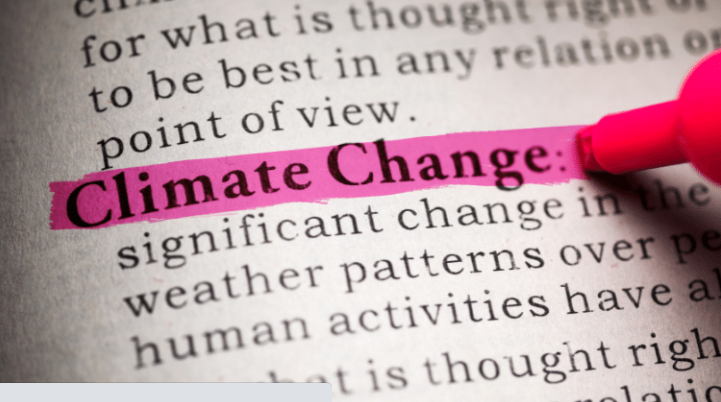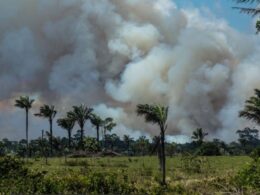Health Affairs
Stefan Wheat, Jay Lemery, Vijay S. Limaye
MARCH 24, 2022
Key messages
by Joaquim Cardoso MSc.
The Health Revolution Institute
Health Data Unit
Chief Strategy Officer and Chief Editor
March 26, 2022
What is the problem?
Climate change is increasingly threatening human health, but we lack authoritative data on the magnitude of this worsening crisis
- A 2014 report from the World Health Organization (WHO) declared that climate change could cause approximately 250,000 additional deaths per year between 2030 and 2050. Their estimate has been criticized as conservative by many climate health experts.
- We face critical gaps in confronting the climate crisis and its effects on human health because these hospital visits were not coded properly in medical records
What are the issues?
- Gathering and sharing accurate and comprehensive data on climate-sensitive public health threats is exceptionally difficult
- Unfortunately, when it comes to climate exacerbated disease, there is no hospital billing code for “hottest day of the year,” “unprecedented extreme weather,” or “patient harmed by climate change.”
What is necessary?
- We need better data to translate the tragedies caused by climate change into medical codes and databases that can serve as a foundation for improved understanding of this growing crisis.
- Improved coding to capture climate-sensitive health harms — including worsening extreme heat, drought, storms, fires, and sea level rise and floods — can allow for the identification of emerging factors impairing the health of patients and promote effective tailoring of clinical and social policy interventions.
What are the recommendation?
- The development — by the CDC’s National Center for Health Statistics — of new climate-relevant disease classification codes such as “sequela from heatwave,” and “exposure to wildfire smoke” would help …
- Improving health care recordkeeping for climate change-harmed patients in emergency departments and hospitals is a simple way for us to start building that sorely needed evidence base.
What is the role of the health professionals and providers (HCP)?
- As the immense risks of climate change to our health become even more obvious, the voices of health professionals are critical for helping to make the case for policies that protect people.
- In doing so, doctors and nurses can help to explain how our country’s continuing reliance on polluting fossil fuels is contributing to both life-threatening chronic disease and deadly risks from stronger heatwaves, fires, storms, and floods.
- Health care providers are at the forefront of an urgent movement to respond to this historic challenge, and we need to equip them and decision makers at every level of government with better data that can inform smarter responses to the climate threat.
- At the same time, we need stronger, sustained research investments from the federal government and improved coordination of climate and health efforts from philanthropic groups, along with climate-contextualized health data to better inform all of these efforts over the long term.
What are the benefits?
- Better accounting of the tremendous human suffering already being fueled by climate change can motivate and inform expanded ambition to cut climate pollution and strengthen community preparedness and keep more people out of harm’s way.
- Making the tremendous human suffering fueled by climate change more visible through improved medical coding can also make it more actionable and help to keep more people out of harm’s way.
Conclusion
- Clinicians are uniquely positioned to help identify and map the true extent of the crisis through improved medical coding!
- We should leverage the tools already at our disposal — including codes such as “exposure to other forces of nature” and “hurricane, initial encounter” and “flood, sequela” — to better describe and track what we are seeing in patients.
ORIGINAL PUBLICATION (full version)

We’re Awash In Climate Change Data, But Health Damages Remain Undercounted
Health Affairs
Stefan Wheat, Jay Lemery, Vijay S. Limaye
MARCH 24, 2022
A homeless man was found curled up on the sidewalk, his skin scalded from the pavement. A pregnant migrant woman was found unconscious in the desert requiring a ventilator due to the profound heat stroke she experienced trying to cross the border from Mexico. A child was wheezing after several days of being exposed to thick plumes of wildfire smoke.
As emergency physicians and a climate and health epidemiologist, we reflect on these tragedies and recognize them for what they are: stories of people’s health harmed, sometimes irreversibly, by climate change.
The reality, however, is that most medical records don’t reflect that truth.
We face critical gaps in confronting the climate crisis and its effects on human health because these hospital visits were coded in medical records as “burn of unspecified body region” and “altered mental status, encephalopathy, and hypoxic respiratory failure,” and “unspecified asthma with acute exacerbation” respectively.
Although the clear driver of these patients’ ailments was unprecedented heat fueled by climate pollution, our medical records failed to account for this basic fact.
We missed the forest for the trees.
Although the clear driver of these patients’ ailments was unprecedented heat fueled by climate pollution, our medical records failed to account for this basic fact.
We missed the forest for the trees.

As the recent report from the Intergovernmental Panel on Climate Change on the impacts, adaptation, and vulnerability for human society highlights, climate change is increasingly threatening human health, but we lack authoritative data on the magnitude of this worsening crisis.
… climate change is increasingly threatening human health, but we lack authoritative data on the magnitude of this worsening crisis.
For example, a 2014 report from the World Health Organization (WHO) declared that climate change could cause approximately 250,000 additional deaths per year between 2030 and 2050.
climate change could cause approximately 250,000 additional deaths per year between 2030 and 2050.
Their estimate has been criticized as conservative by many climate health experts.
Nonetheless, the WHO report seems inconsistent with the Lancet’s characterization of climate change as the greatest global health threat of the 21st century. Is climate change just another public health challenge, or the greatest existential threat to health we have ever faced?
Evidence demonstrating the true extent of this global problem remains elusive.

Gathering and sharing accurate and comprehensive data on climate-sensitive public health threats is exceptionally difficult!
The current lingua franca for recording health care diagnoses, procedures, medical services, and equipment is through standardized medical codes, codified as the 10th edition of the International Statistical Classification of Diseases and Related Health Problems (ICD-10).
Unfortunately, when it comes to climate exacerbated disease, there is no hospital billing code for “hottest day of the year,” “unprecedented extreme weather,” or “patient harmed by climate change.”
Unfortunately, when it comes to climate exacerbated disease, there is no hospital billing code for “hottest day of the year,” “unprecedented extreme weather,” or “patient harmed by climate change.”
We think it’s time for an upgrade
We think it’s time for an upgrade.
Summing up a patient care interaction with a medical diagnosis code often feels impersonal and may be an imperfect characterization of the encounter for the clinician caring for that individual.
Working within the ICD-10 system, though, has the advantage of enabling a searchable, comprehensive database through a massive range of illnesses, injuries, and deaths and helps us understand and even predict disease trends, emerging pathologies, and support the strategies to deliver better care.
Working within the ICD-10 system, though, has the advantage of enabling a searchable, comprehensive database through a massive range of illnesses, injuries, and deaths and helps us understand and even predict disease trends, emerging pathologies, and support the strategies to deliver better care.
For most clinicians, recordkeeping and billing are far from their favorite responsibilities, but they are key data points for protecting public health, and now, adapting to climate change.
For most clinicians, recordkeeping and billing are far from their favorite responsibilities, but they are key data points for protecting public health, and now, adapting to climate change.
Moreover, improved coding to capture climate-sensitive health harms — including worsening extreme heat, drought, storms, fires, and sea level rise and floods — can allow for the identification of emerging factors impairing the health of patients and promote effective tailoring of clinical and social policy interventions.
Moreover, improved coding to capture climate-sensitive health harms — including worsening extreme heat, drought, storms, fires, and sea level rise and floods — can allow for the identification of emerging factors impairing the health of patients and promote effective tailoring of clinical and social policy interventions.
Accounting for patients’ suffering from climate hazards through better medical coding can help researchers to translate the stories of people harmed by the effects of climate change into new understanding that motivates policies and investments that prioritize public health protection.
The widespread application of more precise, climate-cognizant coding could help society to better understand and respond to the growing toll of climate change on public health in the United States.
Currently, such codes represent an essential source of epidemiological data for mapping the impacts of climate change for data analysts at agencies such as the Centers for Disease Control and Prevention (CDC).
The widespread application of more precise, climate-cognizant coding could help society to better understand and respond to the growing toll of climate change on public health in the United States

Climate change is also a major contributor to worsening health inequities!
This challenge was explicitly acknowledged by the Biden administration’s executive order 14008 and the newly established Office of Climate Change and Health Equity within the Department of Health and Human Services.
This challenge was explicitly acknowledged by the Biden administration’s executive order 14008 and the newly established Office of Climate Change and Health Equity within the Department of Health and Human Services.
It is no mistake that the office’s name and mission link climate change and health equity because we know that the effects of climate change are not felt equally across populations.
Here, too, improved medical coding to capture climate-sensitive effects can help to drive the conversation toward improved health equity in the face of worsening climate change.

Clinicians are uniquely positioned to help identify and map the true extent of the crisis through improved medical coding!
We should leverage the tools already at our disposal — including codes such as “exposure to other forces of nature” and “hurricane, initial encounter” and “flood, sequela” — to better describe and track what we are seeing in patients.
We should leverage the tools already at our disposal — including codes such as “exposure to other forces of nature” and “hurricane, initial encounter” and “flood, sequela” — to better describe and track what we are seeing in patients.

We need better data to translate the tragedies caused by climate change into medical codes and databases that can serve as a foundation for improved understanding of this growing crisis.
The development — by the CDC’s National Center for Health Statistics — of new climate-relevant disease classification codes such as “sequela from heatwave,” and “exposure to wildfire smoke” would help medical professionals and patients to understand the scope of the health threats posed by climate change and inform policies to keep people safe in a rapidly changing world.
Making the tremendous human suffering fueled by climate change more visible through improved medical coding can also make it more actionable and help to keep more people out of harm’s way.
We need better data to translate the tragedies caused by climate change into medical codes and databases that can serve as a foundation for improved understanding of this growing crisis
As the immense risks of climate change to our health become even more obvious, the voices of health professionals are critical for helping to make the case for policies that protect people.
As the immense risks of climate change to our health become even more obvious, the voices of health professionals are critical for helping to make the case for policies that protect people.
In doing so, doctors and nurses can help to explain how our country’s continuing reliance on polluting fossil fuels is contributing to both life-threatening chronic disease and deadly risks from stronger heatwaves, fires, storms, and floods.
Health care providers are at the forefront of an urgent movement to respond to this historic challenge, and we need to equip them and decision makers at every level of government with better data that can inform smarter responses to the climate threat.

At the same time, we need stronger, sustained research investments from the federal government and improved coordination of climate and health efforts from philanthropic groups, along with climate-contextualized health data to better inform all of these efforts over the long term.
Conclusion!
Improving health care recordkeeping for climate change-harmed patients in emergency departments and hospitals is a simple way for us to start building that sorely needed evidence base.
Ultimately, better accounting of the tremendous human suffering already being fueled by climate change can motivate and inform expanded ambition to cut climate pollution and strengthen community preparedness and keep more people out of harm’s way.
Ultimately, better accounting of the tremendous human suffering already being fueled by climate change can motivate and inform expanded ambition to cut climate pollution and strengthen community preparedness and keep more people out of harm’s way.
Originally published at https://www.healthaffairs.org
About the authors
Stefan Wheat is an emergency medicine physician and climate and health science policy fellow at the University of Colorado School of Medicine.
Jay Lemery is a professor of emergency medicine and co-director of the Climate & Health Program at the University of Colorado School of Medicine.
Vijay S. Limaye is a senior scientist at the Natural Resources Defense Council in New York, New York.












